For speed readers, I reckon that our economy is being hollowed out by an exodus of wealth generators who are voting with their feet against higher taxes that pay for an expanding government and a growing list of beneficiaries. They are leaving behind a country dominated by a conservative group of voters who increasingly depend on the state for their income, creating a self-sustaining driver towards higher taxes and bigger governments. Only an economic crisis and a government with a new (hopefully not secret) agenda can stop New Zealand from congealing into a low growth, high tax economy that becomes a nursery for Australia. This crisis-driven swathe of reform is more likely than it has been, but is still unlikely with the current political landscape.
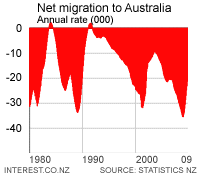 Jim asked whether I agreed with recent comments from PricewaterhouseCoopers partner John Shewan that forcing the top earning 15% of the population to pay nearly 60% of personal income tax was not politically sustainable. Shewan's suggestion was that GST would have to rise or the rich would revolt. I hadn't expected the question so I babbled an answer about how it was unlikely the rich would grab their torches and pitchforks right now and force through a higher GST, but that it was ultimately an unfair result of our democracy that a rich minority was forced to pay high taxes to a poorer majority. I suggested one expression of this voter anger might come in our election on November 7. Thinking about it a bit more I realised I was wrong about a couple of things. Firstly, fairness doesn't matter at all in a democracy or in most other forms of government -- self interest rules, it seems. Secondly, I was being optimistic about the 'rich' having their say at the ballot box and eventually changing the economy back towards a lower tax, smaller government version of the economy.
Jim asked whether I agreed with recent comments from PricewaterhouseCoopers partner John Shewan that forcing the top earning 15% of the population to pay nearly 60% of personal income tax was not politically sustainable. Shewan's suggestion was that GST would have to rise or the rich would revolt. I hadn't expected the question so I babbled an answer about how it was unlikely the rich would grab their torches and pitchforks right now and force through a higher GST, but that it was ultimately an unfair result of our democracy that a rich minority was forced to pay high taxes to a poorer majority. I suggested one expression of this voter anger might come in our election on November 7. Thinking about it a bit more I realised I was wrong about a couple of things. Firstly, fairness doesn't matter at all in a democracy or in most other forms of government -- self interest rules, it seems. Secondly, I was being optimistic about the 'rich' having their say at the ballot box and eventually changing the economy back towards a lower tax, smaller government version of the economy.
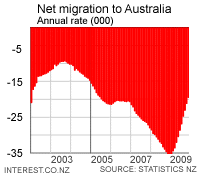 Instead, they are voting in another and altogether more depressing way that will reinforce the system they are protesting against. They are voting with their feet to buy one-way tickets to Australia. The scale of this exodus needs to be explained in some depth to show how big a problem it is and what it means for our political and economic future. The chart at the top shows the steep increase in the number of New Zealanders leaving permanently to live in Australia in the last 3 years. In the year to September net migration hit a record 33,929, beating the previous record of 33,703 in the year to January 1989. The gross figure in the year to September was 47,166 or 129 per day. Since November 1999 a gross 306,452 people have left New Zealand, while net migration was 189,801. This number was at least four times larger than the margin of victory for Labour in the 2005 election of 45,506. In 1999, Labour received 800,199 votes or 38.7% of the 2.05 million votes cast, while National received 629,932 or 30.5% of the vote. In 2005, Labour received 935,319 votes or 41.1% of the 2.286 million votes cast, while National received 889,813 votes or 39.1% of the vote.
Instead, they are voting in another and altogether more depressing way that will reinforce the system they are protesting against. They are voting with their feet to buy one-way tickets to Australia. The scale of this exodus needs to be explained in some depth to show how big a problem it is and what it means for our political and economic future. The chart at the top shows the steep increase in the number of New Zealanders leaving permanently to live in Australia in the last 3 years. In the year to September net migration hit a record 33,929, beating the previous record of 33,703 in the year to January 1989. The gross figure in the year to September was 47,166 or 129 per day. Since November 1999 a gross 306,452 people have left New Zealand, while net migration was 189,801. This number was at least four times larger than the margin of victory for Labour in the 2005 election of 45,506. In 1999, Labour received 800,199 votes or 38.7% of the 2.05 million votes cast, while National received 629,932 or 30.5% of the vote. In 2005, Labour received 935,319 votes or 41.1% of the 2.286 million votes cast, while National received 889,813 votes or 39.1% of the vote. 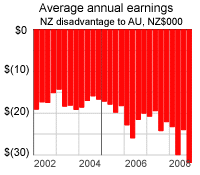 During this period both local and central governments grew consistently and faster than the rest of the economy. The number of people receiving benefits, Working for Families payments and/or working for local and central governments rose to around 1.45 million by September 2008 from 820,000 in June 1999. That's a 72% increase, driven largely by growth in Working for Families and 37% growth in government employee numbers to 307,000. This means that now we have 1.85 million people working and paying taxes to 1.75 million who receive benefits or work for the government. This near 1 to 1 ratio compares with a near 1.5 workers to 1 beneficiary in 1999. This increase in the size of government was paid for by rampant local body rates inflation, the new 39 cent personal income tax rate and by fiscal drag as inflation adjustments weren't made to tax thresholds. Indirectly, higher fees and charges by local governments and state owned enterprised also helped pay for the increased spending. Many thanks to David Chaston for compiling these numbers from official sources in this story. What am I suggesting here? Essentially, this growth in government is driving centre-right voters overseas and is encouraging centre-left voters to stay. The essentially conservative nature of the remaining voters and MMP is cementing in these policies. The upcoming election result will confirm this, regardless of which centrist party wins. The end result is a hollowed out, congealed economy with low wages and high taxes.
During this period both local and central governments grew consistently and faster than the rest of the economy. The number of people receiving benefits, Working for Families payments and/or working for local and central governments rose to around 1.45 million by September 2008 from 820,000 in June 1999. That's a 72% increase, driven largely by growth in Working for Families and 37% growth in government employee numbers to 307,000. This means that now we have 1.85 million people working and paying taxes to 1.75 million who receive benefits or work for the government. This near 1 to 1 ratio compares with a near 1.5 workers to 1 beneficiary in 1999. This increase in the size of government was paid for by rampant local body rates inflation, the new 39 cent personal income tax rate and by fiscal drag as inflation adjustments weren't made to tax thresholds. Indirectly, higher fees and charges by local governments and state owned enterprised also helped pay for the increased spending. Many thanks to David Chaston for compiling these numbers from official sources in this story. What am I suggesting here? Essentially, this growth in government is driving centre-right voters overseas and is encouraging centre-left voters to stay. The essentially conservative nature of the remaining voters and MMP is cementing in these policies. The upcoming election result will confirm this, regardless of which centrist party wins. The end result is a hollowed out, congealed economy with low wages and high taxes.  The nature of MMP discourages the mainstream political parties from both sides making promises that are painful for anyone or enacting policies that are painful for anyone. The balance of power is so finely tuned and the electorate is so opposed to anything that is disruptive or involves change that few change are proposed before elections or undertaken in power. The only major changes that can be made are outside the parliamentary process, or more specifically, inside the budgetary process and the mechanics of executive government. Confidence and supply agreements make it possible for any government to change the structure of the budget as long as it involves increasing payments or benefits to the broadest group of people. Cutbacks or reductions in services are almost impossible, except for one term governments or short term governments. That doesn't mean to say changes in the structure of the government or the economy can't happen. The great irony of MMP is that since 1999 a signficant change has happened without an electoral mandate, but it happened by adding spending and using the power of fiscal drag and SOE super profits to pay for some of it. Apart from the 39 cent tax rate, none of these changes involved major legislative disruption that required the express and specific approval of parliament. It all happened in the budget bills or through ministerial and cabinet decisions.
The nature of MMP discourages the mainstream political parties from both sides making promises that are painful for anyone or enacting policies that are painful for anyone. The balance of power is so finely tuned and the electorate is so opposed to anything that is disruptive or involves change that few change are proposed before elections or undertaken in power. The only major changes that can be made are outside the parliamentary process, or more specifically, inside the budgetary process and the mechanics of executive government. Confidence and supply agreements make it possible for any government to change the structure of the budget as long as it involves increasing payments or benefits to the broadest group of people. Cutbacks or reductions in services are almost impossible, except for one term governments or short term governments. That doesn't mean to say changes in the structure of the government or the economy can't happen. The great irony of MMP is that since 1999 a signficant change has happened without an electoral mandate, but it happened by adding spending and using the power of fiscal drag and SOE super profits to pay for some of it. Apart from the 39 cent tax rate, none of these changes involved major legislative disruption that required the express and specific approval of parliament. It all happened in the budget bills or through ministerial and cabinet decisions.  Budgets have largely been used to apply more government spending to more groups, either directly in the form of wages and salaries, or indirectly in the form of Working for Family rebates, higher pensions and free student loans. The recipients who are the majority love them, but they are paid for by an increasingly disgruntled minority. This inevitable result of our political system is sustainable for as long as we don't have an economic crisis. This slow hollowing out by a thousand cuts is still the most likely scenario, but a crisis that forces significant reforms is more possible. That's because the above average economic growth we've seen for most of the last 6-8 years was powered by household debt rather than productivity growth. The truth of our low growth, low wage, high tax economy is beginning to dawn on some voters and more radical reform to improve our growth rate may be possible if an economic crisis shocks voters into realising change is needed.
Budgets have largely been used to apply more government spending to more groups, either directly in the form of wages and salaries, or indirectly in the form of Working for Family rebates, higher pensions and free student loans. The recipients who are the majority love them, but they are paid for by an increasingly disgruntled minority. This inevitable result of our political system is sustainable for as long as we don't have an economic crisis. This slow hollowing out by a thousand cuts is still the most likely scenario, but a crisis that forces significant reforms is more possible. That's because the above average economic growth we've seen for most of the last 6-8 years was powered by household debt rather than productivity growth. The truth of our low growth, low wage, high tax economy is beginning to dawn on some voters and more radical reform to improve our growth rate may be possible if an economic crisis shocks voters into realising change is needed. 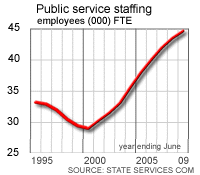 This is a pity. Our political leaders should be laying out this challenge before us and coming up with realistic options to get New Zealand back on a higher growth path. But neither of them are because they either want to retain or win power in an MMP environment. Rightly or wrongly, they believe they can either change it from the inside or that it doesn't need change. One centrist party (Labour) says nothing is structurally wrong and the current problems are purely international and short term problems. The other centrist party (National) is telling voters they need not worry about big changes in the structure of our economy because the important thing is to have different faces and decision makers in charge of the public purse. Whichever centrist party wins, the chances of significant changes to the structure and level of government spending are small, unless one or the other breaks its promises and implements a 'secret agenda'. Labour is accusing National of having a 'secret agenda' it will 'discover' as soon as it takes power, potentially using the economic crisis as an excuse.
This is a pity. Our political leaders should be laying out this challenge before us and coming up with realistic options to get New Zealand back on a higher growth path. But neither of them are because they either want to retain or win power in an MMP environment. Rightly or wrongly, they believe they can either change it from the inside or that it doesn't need change. One centrist party (Labour) says nothing is structurally wrong and the current problems are purely international and short term problems. The other centrist party (National) is telling voters they need not worry about big changes in the structure of our economy because the important thing is to have different faces and decision makers in charge of the public purse. Whichever centrist party wins, the chances of significant changes to the structure and level of government spending are small, unless one or the other breaks its promises and implements a 'secret agenda'. Labour is accusing National of having a 'secret agenda' it will 'discover' as soon as it takes power, potentially using the economic crisis as an excuse. 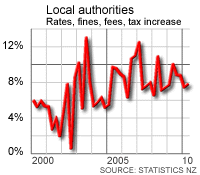 Some may hope this is the case. It seems very unlikely given both the current state of the polls and the people in charge of both parties. Even if New Zealand First are not elected, a Labour-Green-United Future-Progressive-Maori Party government looks most likely. Even if National get the highest vote and NZ First are not elected, it will need the support of the Maori Party to govern. This is unlikely. A much more preferable option is for our politicians to unveil the scale of the financial crisis before us and map out the changes needed to the structure of our economy to achieve a high growth, high wage economy that offers an alternative to the wealth generators currently fleeing the country. I'd much prefer a public agenda to deal with a crisis to a secret or even undeveloped one that could easily destroy public confidence in our political system all over again. For what it's worth, I think that public agenda should include more and better infrastructure and education investment (even if by government), less and better government spending on benefits, and better government spending on services such as health, education and social welfare. It would also mean a flatter, simpler tax system to fund a government sector chewing up 30% of GDP or less, not the 40% or plus that Labour is aspiring to and National has promised not to change.
Some may hope this is the case. It seems very unlikely given both the current state of the polls and the people in charge of both parties. Even if New Zealand First are not elected, a Labour-Green-United Future-Progressive-Maori Party government looks most likely. Even if National get the highest vote and NZ First are not elected, it will need the support of the Maori Party to govern. This is unlikely. A much more preferable option is for our politicians to unveil the scale of the financial crisis before us and map out the changes needed to the structure of our economy to achieve a high growth, high wage economy that offers an alternative to the wealth generators currently fleeing the country. I'd much prefer a public agenda to deal with a crisis to a secret or even undeveloped one that could easily destroy public confidence in our political system all over again. For what it's worth, I think that public agenda should include more and better infrastructure and education investment (even if by government), less and better government spending on benefits, and better government spending on services such as health, education and social welfare. It would also mean a flatter, simpler tax system to fund a government sector chewing up 30% of GDP or less, not the 40% or plus that Labour is aspiring to and National has promised not to change.

We welcome your comments below. If you are not already registered, please register to comment
Remember we welcome robust, respectful and insightful debate. We don't welcome abusive or defamatory comments and will de-register those repeatedly making such comments. Our current comment policy is here.